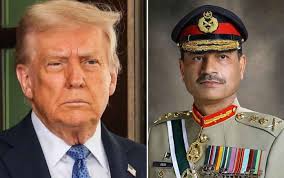US President Donald Trump to host Pakistan Army chief Asim Munir for lunch

In a high-profile diplomatic move, former U.S. President Donald Trump is hosting Pakistan’s Army Chief, General Asim Munir, for a private lunch at the White House. The meeting, set for June 18, 2025, signals a renewed interest in U.S.-Pakistan relations. It could reshape regional power dynamics.
A Rare Invitation for a Powerful Guest
This is the first time in over a decade that a Pakistani army chief is meeting a U.S. president in such a setting. General Munir holds immense influence in Pakistan. He guides national security, foreign policy, and even domestic stability. His visit reflects Pakistan’s critical role in South Asia and Trump’s evolving diplomatic priorities.
Instead of meeting Prime Minister Shehbaz Sharif, Trump has chosen to speak with Munir directly. This decision shows who truly holds power in Pakistan. It also suggests Washington wants to engage with the country’s military leadership on pressing security issues.
Beyond the Lunch Table: What’s at Stake?
Though described as a “working lunch,” the discussion is expected to cover key global topics. Among the main points:
- Afghanistan’s instability: Both nations worry about the Taliban’s rule and ISIS-K’s growing threat.
- India-Pakistan tensions: Renewed clashes and political posturing have raised international concerns.
- China’s growing footprint: Pakistan’s alliance with China, including new defense deals, has caught Washington’s attention.
- Middle East unrest: As conflict simmers between Iran and Israel, Pakistan’s regional influence has become more important.
Walking a Diplomatic Tightrope
Pakistan is juggling its relationships. It relies on Chinese investment through the China-Pakistan Economic Corridor (CPEC). But it also needs Western support, especially with its economy under stress.
Trump may see this visit as an opportunity. He could pull Pakistan closer to the U.S. by offering trade benefits, military cooperation, or debt relief. Pakistan, in turn, may use this moment to balance its ties between two global powers.
Public Reactions and Global Response
Trump’s decision has stirred mixed reactions. Activists and rights groups have criticized the move. Many accuse General Munir of suppressing dissent. Protests are expected outside the White House. Demonstrators have called him a “uniformed dictator.”
India is also watching closely. New Delhi has often viewed U.S.-Pakistan talks with suspicion, especially when they involve military figures. Still, American analysts believe the U.S. can manage relations with both India and Pakistan.
Strategic Risk or Bold Diplomacy?
Some see this lunch as a risk. Others believe it shows Trump’s bold, direct approach to global politics. He has always preferred face-to-face diplomacy. This meeting fits his style.
For Munir, the visit boosts his global image. It gives him a chance to present Pakistan as a responsible and stable nuclear power. It also strengthens his domestic standing during a time of political uncertainty.
What Could Follow?
Immediate results may be limited. But the long-term impact could be significant. If the two sides follow up with defense agreements or diplomatic cooperation, the meeting may mark a turning point.
Possible future collaborations include:
- Counter-terrorism operations
- U.S. investment in Pakistan’s mineral resources
- Joint work on cyber threats and crypto policy
- Water and climate diplomacy in the region
The U.S. may also seek Pakistan’s help in talks with Iran or rebuilding Afghan stability.
Conclusion
This lunch between Trump and Munir is more than just a meal. It’s a calculated diplomatic move with regional and global consequences.
It shows that both nations are willing to re-engage. They recognize each other’s importance in shaping South Asia’s future. Whether it leads to stronger cooperation or remains symbolic, the message is clear: strategic dialogue is back on the table.






